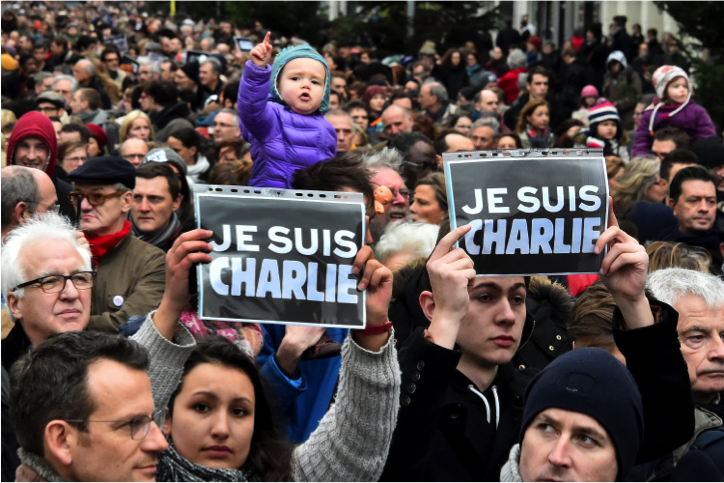Charlie Hebdo: Where do we draw the line?
There have been mass protests in regard to Charlie Hebdo’s controversial publication. The cover had featured the Prophet Muhammed in a negative light. The protesters hold signs saying “Je suis Charlie” or, “I am Charlie” in support of the victims.
February 11, 2015
In Paris, On Wed., January 7, 12 people were killed in a massacre. The victims were journalists at the office of “Charlie Hebdo”, a French satirical magazine. The attack was to avenge the Prophet Muhammad after cartoons portraying him in a negative light were published in the magazine.
The two Islamic gunmen responsible for the attack allegedly shouted “God is great” and “we have avenged the Prophet” in Arabic. To support the victims after the attack, many people protested with the phrase “Je suis Charlie,” which translates to “I Am Charlie.”
Many Muslims believe that images or depictions of the Prophet are forbidden. So when the magazine was released, it immediately became a controversy. The protests around the country were against violence and for freedom of speech.
Where do we draw the line? How can we distinguish between satire and deliberate antagonism?
Exercising the right to freedom of speech includes stating your own opinion. But others can exercise their right to freedom of speech by not agreeing with you or protesting.
This situation was an example of extremists taking action. Murdering 12 people in cold blood is wrong. There is absolutely no excuse or justification for murder, regardless of the situation.
In this case, the murderers viewed the cartoons as blasphemy while the journalists believed in their right to express opinions through satire.
Satire is “a way of using humor to show that someone or something is foolish, weak, bad, hypocritical, etc.” For any type of issue, the jokes need to have an explanation. Satirical news shows like “The Daily Show” or “The Colbert Report,” are now common.
The line between satire and bigotry gets fuzzy, especially dealing with controversial cultural issues. You cannot try to say something bigoted or hateful and pass it off as satire
The magazine has had a history of racist, Islamaphobic, and homophobic opinions. Does freedom of speech include publicly promoting racist views?
Our perceptions of freedom arise from underlying cultures. In some parts of the world, it might be illegal to do something blasphemous. As the world becomes more multicultural, we interact across cultures with many different viewpoints. As such, what might be considered as valid satire by one culture could be considered blasphemy in another culture.
What do we do in such a scenario? How do we understand each other? In a democratic society, free speech, even insulting speech, is prized. Particularly, we value satire as a tool against power. But we can do a better job of engaging across cultures, in making our viewpoints understood contextually.




![Mock Trial members from Gold and Green team last year pose for a picture in front of the OCLRE building in Columbus. "We all put in so much work [last] year. I know [this] year we’ll come back improved and ready to win!” said Ogunbodede.](https://shsleaf.org/wp-content/uploads/2025/10/IMG_4121-300x205.jpg)


